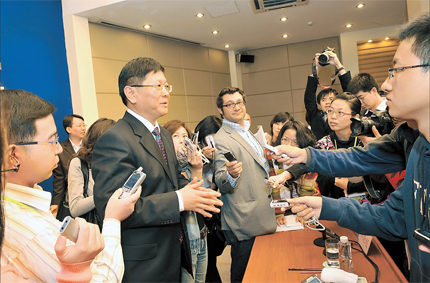Inflation not an immediate concern
|
|
|
Li Xiaochao, a spokesman for the National Bureau of Statistics, is surrounded by reporters at a press conference in Beijing yesterday. Inflation is not an immediate problem for China, Li said. |
Inflation is not an immediate problem for China but the country needs to watch prices and regulate expectations for inflation, said Li Xiaochao, a spokesman for the National Bureau of Statistics.
China's Consumer Price Index fell 0.8 percent from a year earlier last month, the weakest contraction in six months. The pace eased from declines of 1.2 percent in August and 1.8 percent in July.
The CPI dropped 1.1 percent in the first three quarters.
The Producer Price Index, the main gauge of factory-gate prices, retreated 7 percent last month, compared with declines of 7.9 percent in August and 8.2 percent in July. It dropped 6.5 percent in the January-September period.
"Both consumer prices and producer prices remain in the negative territory on a yearly basis, which suggests there is no problem of inflation right now," Li said.
"But we have to closely watch people's expectations for inflation when both gauges have posted increases on a monthly basis," he cautioned.
Consumer prices gained 0.4 percent month on month in September and 0.5 percent in August, while producer prices have reported monthly gains since April.
On Wednesday, Chinese Premier Wen Jiabao said China will continue its current policy stance - a proactive fiscal policy and a relatively easing monetary policy - but will fine tune policies to be more flexible to adapt to changing situations in domestic and global markets.
Wen cited "keep the country's growth momentum, restructure its economy and regulate people's expectations for inflation" as key tasks in the future.
Li Maoyu, an analyst at Changjiang Securities Co, said he expected annualized consumer prices to rise in November or December fueled by strong purchasing sentiment due to property and vehicle sales.
"The country is not likely to have an abrupt shift of policy stance even if the index rises," Li said. "The priority remains to stimulate the economy and make liquidity ample in the market."
China's M2, the broadest measure of money supply, increased 29.3 percent from a year earlier to 58.5 trillion yuan (US$8.56 trillion) at the end of last month.
China's gross domestic product grew 8.9 percent annually in the third quarter, with growth for the first three quarters at 7.7 percent.
Li said the GDP's likely to grow 8 percent for the whole year.
 0
0 







